Roads to Recovery with Cecil Transit’s COMPASS: 2025 Update
20 minutes Author: Shared-Use Mobility Center Date Launched/Enacted: Sep 24, 2025 Date Published: September 24, 2025
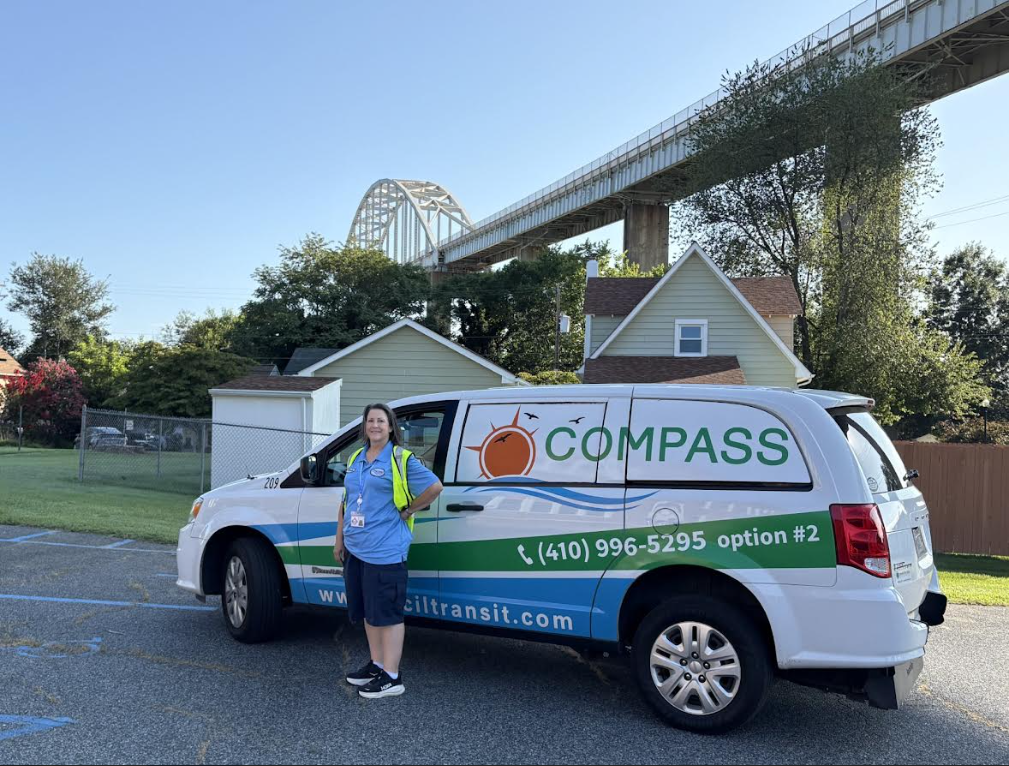
Summary
- With support from a Federal Transit Administration Integrated Mobility Innovation grant, Cecil Transit in Cecil County, Maryland, launched the Cecil On-demand Mobility Platform and Service Solution (COMPASS), a microtransit service specifically designed to serve county residents recovering from drug abuse and addiction, in 2021.
- The COMPASS program has been incredibly impactful to Cecil County residents. Cecil Transit has leveraged additional partnerships and funding sources, including substance abuse prevention grants, to continue the program past its pilot phase.
- Currently, COMPASS serves eight recovery houses and has demonstrated exceptional reliability with zero unfulfilled trips. Passengers use COMPASS to access employment, therapy, grocery stores, and other essential services.
- COMPASS’ story highlights how transit agencies can be resourceful and creative in transitioning on-demand mobility pilot projects into permanent services to meet critical community needs.

This project is part of the Mobility Innovation Collaborative (MIC). The MIC provides a comprehensive suite of technical assistance resources, promotes knowledge sharing activities, and captures stories and lessons learned from innovative mobility projects across the United States.
Originally published September 2025.
Video description: Video interview with Suzanne Kalmbacher with Cecil Transit. Credit: Shared-Use Mobility Center (SUMC)
Introduction
Recovering from addiction is fraught with many challenges, among them is reliable transportation to help access necessary healthcare, employment, education, and other key services. Particularly during the first few months of addiction recovery, those in recovery need to participate in day-to-day activities to avoid social isolation, build a normal routine, and most importantly, avoid potential relapse. Social isolation is especially exacerbated in areas where car dependency is higher, and access to goods and services is more dependent on taking a trip by car.
Like many areas across the United States, Cecil County, Maryland, has been impacted by the opioid epidemic, leading to a variety of social and public health challenges in the community. Recognizing the missing link between addiction recovery, transportation, and access to essential services, Cecil Transit piloted the Cecil On-demand Mobility Platform and Service Solution (COMPASS) program in 2021 through a Federal Transit Administration (FTA) Integrated Mobility Innovation (IMI) grant. COMPASS has proven to be helpful to those who are in recovery by providing access to recovery methods, social events, grocery stores, and healthcare. Since its implementation in 2021, COMPASS has grown to reach a larger passenger base and to provide more efficient and accessible service for passengers.
This case study builds on SUMC’s 2022 case study focused on COMPASS and discusses some of the ways this program has changed and expanded since the end of the IMI grant program in March 2023.
Background
The Opioid Crisis in Cecil County
Cecil County is a mostly rural county in the northeastern corner of Maryland, roughly halfway between Philadelphia and Baltimore. Because of its location between two major cities on the Interstate 95 corridor, drug trafficking is widespread in the county, and the opioid crisis has severely impacted the community. Cecil County has among the highest rates of illicit drug use and dependency in the state of Maryland, and the county’s age-adjusted mortality rates for unintentional drug- and alcohol-related deaths was at 93.5 per 100,000 people from 2020-2022, significantly higher than the state rate of 42.2 and the US rate of 32.6. Cecil County’s rate increased by 129% between 2016 and 2022, while the state rate increased by 77%. Cecil County has developed many robust programs to prevent and combat substance use in the community, but the illicit drug market is ever evolving, moving from opioids to heroin, fentanyl, xylazine, and currently medetomidine (an animal tranquilizer that does not respond to Naloxone). Cecil County continues to work on finding practical solutions to this public health crisis, and many residents and agencies have identified transportation as a key piece of the puzzle.
In the early 2010s, the Cecil County Council enacted the Cecil County Drug and Alcohol Abuse Council (DAAC), an appointed group of Cecil County residents concerned about the role of drug abuse in the community, as one tool for the county to address this public health crisis. Recognizing the inextricable link between mental health and substance use, in 2022 DAAC merged with the Core Service Agency to form the Behavioral Health Advisory Council (BHAC). BHAC continues to work with county agencies and organizations to identify community needs and implement strategies to reduce substance abuse and dependence. Early on, DAAC identified transportation as a critical obstacle to abuse prevention and treatment, and made one of its objectives to “[e]stablish new transportation resources for Cecil County residents seeking prevention, early-intervention and treatment services.” Though DAAC’s strategic plan was developed several years before COMPASS launched, it shows that many in the community were already viewing transportation as a critical component of recovery efforts. Transportation is still noted as a critical social determinant of health, as noted on p. 12 of the 2025 Cecil County Community Health Needs Assessment: “Limited transportation is an access barrier, especially for residents living in rural areas, those without a private vehicle, and limited financial resources.”
The Role of Cecil Transit
Cecil Transit is housed under Cecil County’s Department of Community Services and oversees all transit operations throughout the county, including fixed-route buses, demand-responsive transit, a volunteer driver program, and a taxi-reimbursement program. The taxi-reimbursement program reimburses the cost of rideshare programs for Cecil County commuters of select groups, including seniors, people with disabilities, and those with a household income under $21,600. Cecil Transit developed COMPASS with support from a $562,845 IMI grant as a human service focused microtransit service specifically designed to serve residents of opioid recovery houses in the county. COMPASS launched in April 2021, initially in partnership with six recovery houses. In the early planning stages of the project, the Cecil County Health Department connected with recovery houses to discuss residents’ transportation needs. Cecil Transit determined COMPASS’ service area based on meeting these needs and included as many of the houses and important destinations as possible. Cecil Transit developed memoranda of understanding with the recovery houses to ensure that all partners understood the program as well as their responsibilities as participants.
COMPASS Operations
COMPASS has proven to be a very affordable and reliable service for its users. A one-way trip costs $2, the same price as Cecil Transit’s fixed-route service, a fare that has not increased throughout and beyond the pilot period. Since the beginning of the pilot in 2021, COMPASS has been keen on maximizing service efficiency, and ride demand is balanced to ensure that the entire fleet of Dodge minivans is never on the road at the same time. This balance has been maintained even through steady ridership increases. The chart below shows COMPASS’ ridership growth from under 5,000 completed passenger trips in FY22 to over 10,000 in FY25.
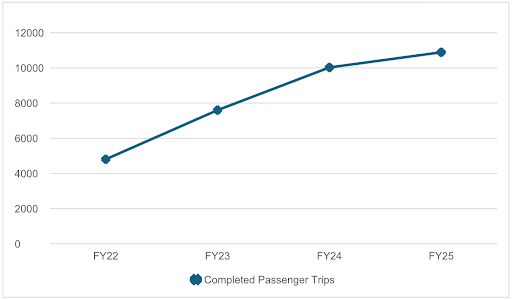
Chart showing COMPASS ridership growth between FY22 and FY25. Credit: Cecil Transit
COMPASS has demonstrated exceptional reliability with zero unfulfilled trips, far exceeding the program’s initial goal of less than 10%. This level of performance reflects a system that is not only operationally efficient but also demonstrates a responsiveness to rider needs. Reliability in this context means that individuals can consistently count on COMPASS to get them to critical destinations, such as grocery stores, treatment, or employment, which are often pivotal to the route to recovery. As shown in the chart below, the vast majority of these trips are for medical or employment purposes, with other trips fulfilling social, retail, education, legal, and religious purposes.
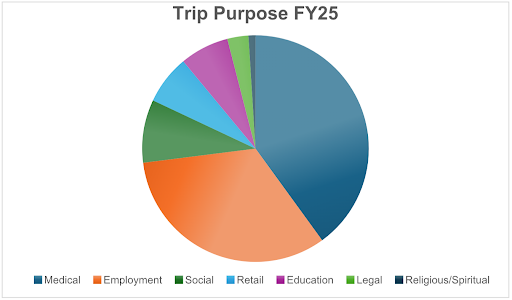
Chart showing the trip purpose of all FY25 COMPASS passenger trips. Credit: Cecil Transit
For many COMPASS riders, especially for those without access to a vehicle, a missed trip can lead to a missed opportunity or setback in their recovery process. The assurance that a scheduled ride will occur helps build trust in the system and allows riders to live more independently.
In addition, COMPASS provides tailored support to its users by coordinating with case managers. Case managers ensure that riders are ready for additional independence, while also ensuring rider privacy during drop-off and pickup. These features have earned the program community support, not just from riders, but also partner organizations. As a result of this positive impact, Cecil Transit has worked to continue COMPASS beyond its pilot phase, which ended in March 2023. Transitioning from a pilot project to a permanent program is not always straightforward, and Cecil Transit has overseen and managed new partnerships, shifts in funding sources, and other changes to keep COMPASS running.
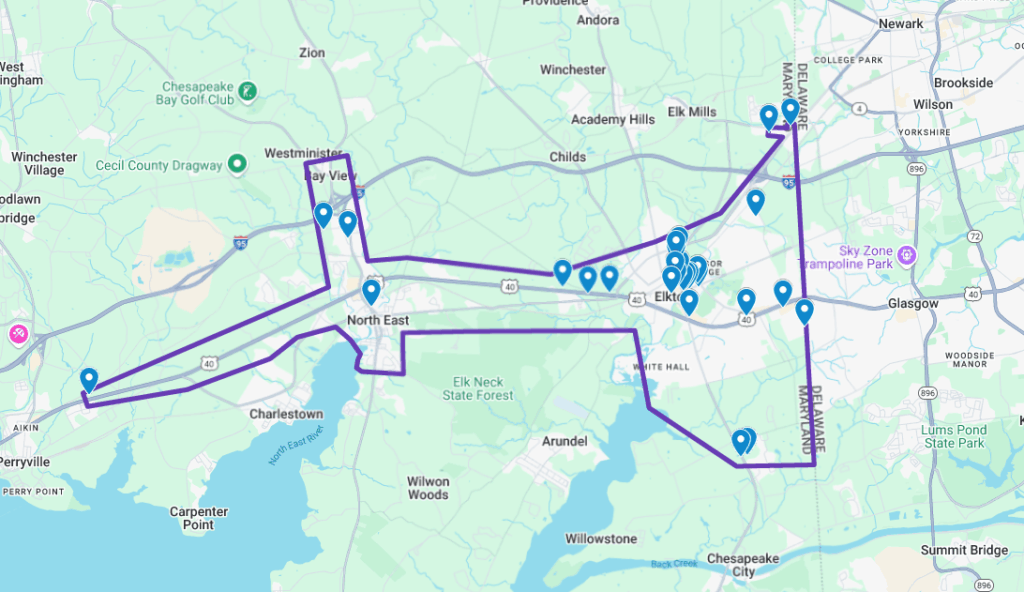
Map of COMPASS’ service area, with markers showing partner recovery houses as well as approved pickup and drop-off locations. Approved pickup and drop-off locations include health centers, shopping centers, early childhood education centers, and the Cecil County District Court. Credit: Cecil Transit
Partnerships
As the pilot project progressed, both Cecil Transit and the Cecil County community saw how impactful the COMPASS program was to residents. Cecil Transit initially partnered with six recovery houses and has since expanded to eight houses in the service zone. Additional recovery houses outside of COMPASS’ 71-square-mile service area have expressed interest in participating in the program. While Cecil Transit hopes to expand the service area of COMPASS in the future, Cecil County’s landscape is very rural, and maintaining the level of service while expanding the service area would take additional vehicles and staff, and run the risk of reducing COMPASS’ reliability and effectiveness. Similarly, some for-profit medical treatment centers have also expressed interest in partnering with Cecil Transit; however, funding for COMPASS is still a hurdle, and working out how these facilities can contribute to the program financially remains a challenge.
Some of Cecil Transit’s most critical partners are other county agencies that help monitor and manage aspects of the opioid crisis. The Cecil County Health Department monitors how drug abuse impacts the people of Cecil County to develop preventative measures and solutions. The Health Department has a deep knowledge base of what is needed for adults in recovery and has helped Cecil Transit guide the program to ensure COMPASS can continuously provide the greatest benefit. Additionally, Cecil Transit works with the Cecil County Adult Drug Treatment Court, which identified that a lack of reliable transportation was a major factor in people missing court appointments and assignments.
For on-demand booking, routing, and dispatching technology, Cecil Transit originally partnered with software provider Routematch. In 2020, shortly after Cecil County was awarded the IMI grant, Uber announced its acquisition of Routematch, and Cecil Transit worked with Routematch as a subsidiary of Uber for the entirety of the pilot period until March 2023. Routematch was a critical partner, particularly at the beginning of the program, as it supported Cecil Transit in building COMPASS as a targeted service for people in recovery for substance abuse. Since the end of the pilot period, Cecil Transit has changed software providers and now partners with Via Transportation. The transition to Via was relatively seamless, and Uber was supportive during the transition period. Now, aside from very minor issues with geopositioning rider pickups and drop-offs, the Via technology works well for riders, drivers, and dispatchers, and is constantly improving both the driver and rider experience. Reliable and user-friendly technology is of paramount importance for keeping the program running; any service failures can result in riders not using the program, ultimately putting the survival of the program at risk.
Funding
Cecil County’s initial IMI award supplied $562,845 for a 12-month demonstration program of COMPASS. This pilot demonstrated a need for Cecil Transit to seek more sustainable funding sources to maintain and expand the service beyond the 12-month pilot. To ensure the continuation of COMPASS past the IMI program, Cecil County reallocated traditional transit funds and pursued additional external funding.
Long-term, supplemental funding from a variety of sources has helped COMPASS grow and expand to meet an additional passenger base. This funding includes a three-year, $66,000 grant through the Comprehensive Opioid Stimulant and Substance Use Program (COSUP), which has provided states and local governments with funding to develop, implement, or expand comprehensive efforts to support those impacted by illicit opioids, stimulants, and other drugs. Additionally, a $100,000 grant from Maryland’s Opioid Restitution Fund, a state-wide program which distributes money from lawsuits against prescription drug producers, has allowed Cecil Transit to extend COMPASS beyond its initial focus on recovery houses to include individuals living independently, as well as expanding their service areas to reach newly participating recovery houses. The combination of these funds has also supported vehicle operations, driver staffing, and improved scheduling and routing technologies. These grants directly supported service delivery improvements such as refining vehicle operations, hiring additional drivers, and improving routing and scheduling technology.
Cecil County has also applied for several competitive federal grants, such as FTA’s Mobility, Access, and Transportation Insecurity, Mobility for All, and Enhancing Mobility Innovation programs. Layering these opportunities helps ensure a continuous and sustainable stream of funding for COMPASS moving forward. Cecil Transit intends to apply for additional funding and has already submitted a letter of intent for the Rural Maryland Prosperity Investment Fund Rural Health program. If this funding is awarded, it will provide an additional $130,000 to help expand the scope of COMPASS to include individuals who need to access healthcare, which may include seniors and people with disabilities, but will be open to anyone referred by a partnering healthcare facility.
Challenges
Since its pilot stage, COMPASS has proven to be an essential service for individuals in addiction recovery by helping provide access to employment, medical and court appointments, grocery stores, and other necessary services. However, this success comes with its share of challenges, especially regarding program expansion; demand is growing, but financial resources to support this demand are limited. Cecil Transit is continuously working to push the COMPASS program to its fullest potential, while acknowledging that there must be a balance between service expansion and financials that can provide support for additional drivers, vehicles, and support services. The risk of overextending service is always at the forefront of service planning, especially as COMPASS seeks to reach more riders and new municipalities.
Thinking forward to expansion, COMPASS also walks a fine line in trying to serve a larger passenger base without denying service to individuals in addiction recovery. Opening COMPASS’ service to the general public also creates an opportunity for additional funding sources, ultimately making the service eligible for FTA’s 5311 and 5307 grants. However, opening the service to the general public may dilute the service, making access to transportation more difficult to obtain for those actively in addiction recovery. With a limited number of vehicles and drivers, Cecil Transit has been carefully planning service expansions and deliveries. Each additional service expansion – whether reaching new municipalities or healthcare providers – poses a strain on the current service model’s functionality. Thus, long-term funding that can help lessen the cost burden of expansion is essential for reaching a new passenger base and keeping the program functioning in its current state. Though the program was initially launched with FTA IMI funding, its continued operation has relied on a creative patchwork of funding from various sources, as discussed in the funding section above.
Despite these hurdles, COMPASS’ impact on the community is undeniable; passengers have spoken to the program’s transformative effect, stating that access to mobility and thus independence provides them with the necessary resources for sobriety (employment, group therapy, and social activities). Drivers have noted that COMPASS helps create a stronger community connection and have heard firsthand about the tangible difference it makes in the lives of passengers. Still, as COMPASS continues to grow, Cecil Transit faces the challenge of balancing limited resources while meeting rising demand and working to protect the original purpose of the program.
Future
Cecil County has many unmet transportation needs, and COMPASS is an adaptable program that can help meet many of those demands. One potential future for Cecil Transit is to expand COMPASS to handle non-emergency medical transportation (NEMT). In rural communities like Cecil County, individuals who do not or cannot drive can have issues accessing routine medical appointments. Often, this lack of reliable transportation leads to missed appointments or potentially misuse of emergency services, causing serious public health implications and strain on hospital resources. NEMT seeks to solve these issues by providing transportation specifically for healthcare appointments. Cecil Transit is exploring partnership opportunities with West Cecil Health Center, which provides medical care to Cecil County residents that might otherwise not be available for the rural community. Cecil Transit is currently working with West Cecil Health Center to determine how to most effectively build a NEMT service related to some of those trips.
Finally, Cecil Transit can take lessons learned from COMPASS to improve its other services, including improving the technology for the county’s dial-a-ride services. Cecil Transit is exploring how COMPASS can potentially operate as a connector to Cecil Transit’s fixed-route buses, fulfilling the critical first and last portions of trips. While Cecil Transit does not have concrete plans for this yet, COMPASS could serve as a first and last mile connector (or, because of the rural and sparse geography of Cecil County, first and last five mile connector), which would greatly improve transportation access throughout the county and further help people get to critical destinations.
Conclusion
COMPASS’ story highlights how transit agencies can be resourceful and creative in transitioning from pilot projects to permanent mobility services. After the completion of the FTA IMI program, Cecil Transit looked to a variety of funding sources, including substance abuse prevention grants, in addition to other transportation grant opportunities. Cecil County has also been flexible in managing partnership changes. As COMPASS evolved, so did many of Cecil Transit’s relationships with vendors, recovery houses, and other government agencies. Cecil Transit navigated and adapted to these changes, ultimately ensuring that each partnership can further the goals of COMPASS. The flexibility and tenacity have allowed Cecil Transit to not only continue COMPASS past its pilot phase but to grow and improve the service to have a greater community impact. In 2023, the Transportation Association of Maryland awarded Cecil Transit its Outstanding Transit System award, in part due to its innovative approach to addressing community needs through programs like COMPASS.
Throughout the program, Cecil County residents have applauded COMPASS and its impacts. COMPASS riders thank drivers nearly every day for helping them get to doctors’ appointments, work, support group meetings, and other necessary services. In surveys administered by Cecil Transit in 2021 and 2022, riders expressed how COMPASS has positively impacted their lives:
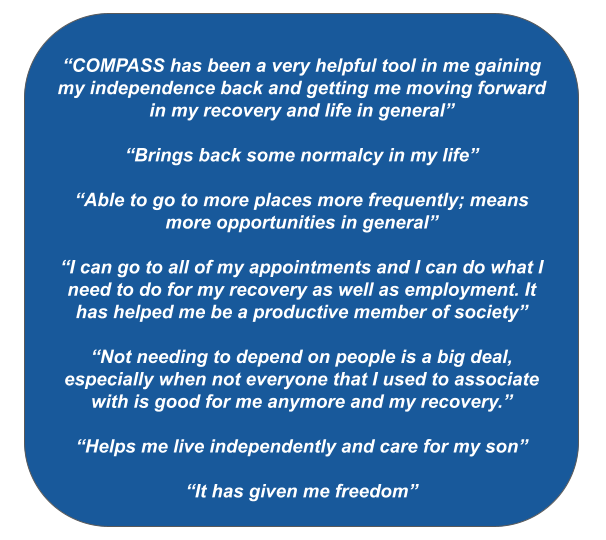
As evident in these testimonials, reliable transportation has a massive impact on social isolation and drug abuse recovery, and COMPASS is a key piece of helping residents get on their feet, stay sober, and be active members of the Cecil County community.